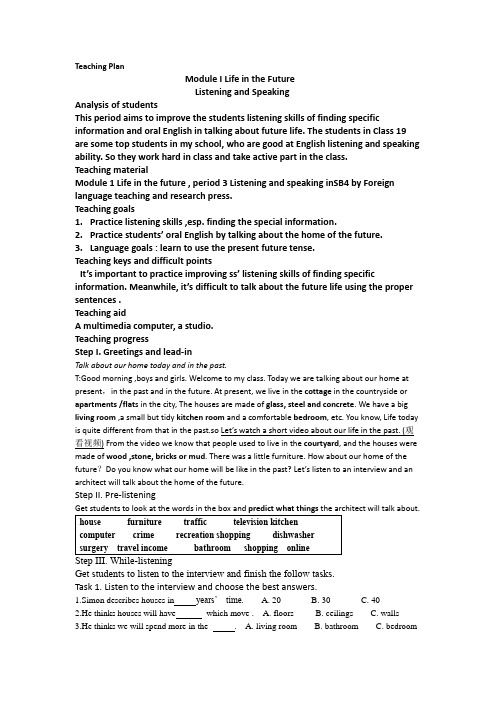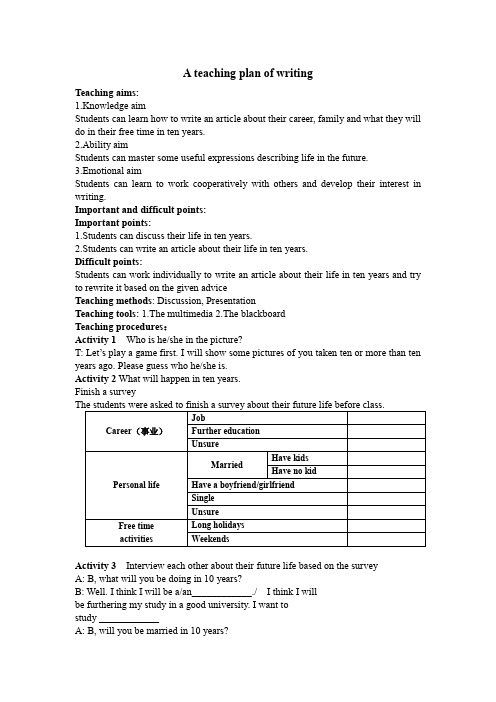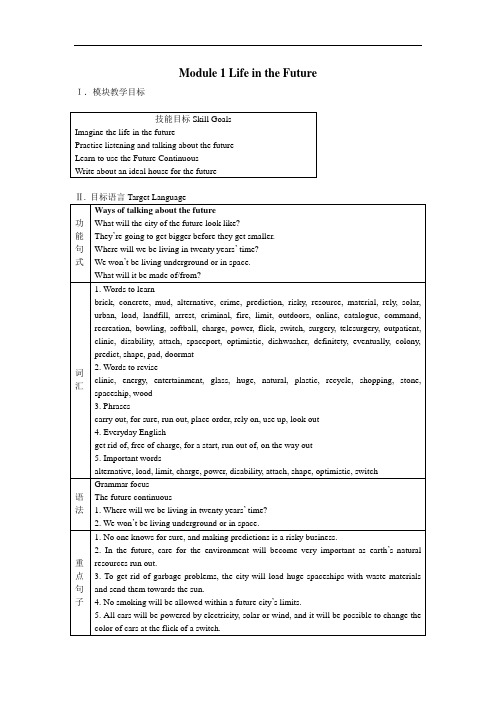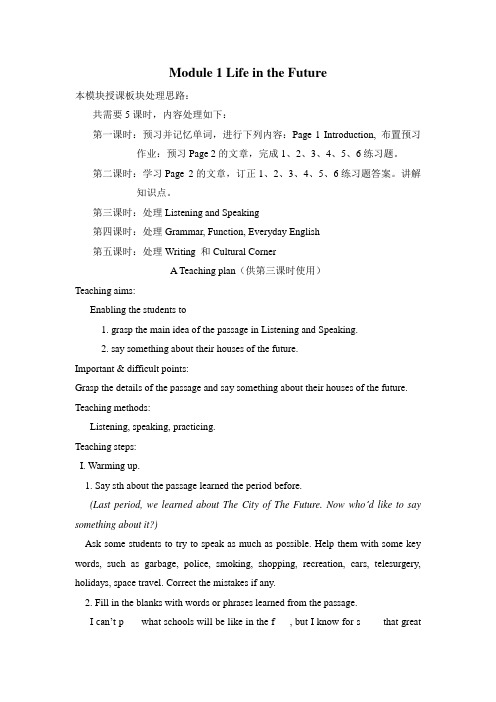外研版高中英语必修四教案Module 1Life in the future
英语必修Ⅳ外研版module 1 life in the future 教案

(1)课前预习,要求学生课前预习本课的生词、句型及主题内容。
(2)鼓励大胆开口,积极参与,学会倾听,克服羞涩、紧张、害怕、逃避等消极心理影响,积极运用所学英语进行表达和交流。
(3)积极创造学习英语的条件与环境,主动与他人合作,共同完成学习任务。
3、交际法:学生可以通过pair work和group work进行交际或交流,培养学生自主及合作学习的能力。
4、讨论法;学生以小组活动的形式进行讨论、合作和探究。
5、以现代化教学手段——多媒体辅助教学,贯穿整个教学过程,增强课堂教学的直观性和趣味性,加大课堂容量,提高教学效果。
四、学法分析
1、学情:本次授课学生为高一年级学生,在完成前三册书的学习当中,已基本适应高中英语学习,并掌握了一定量的词汇,能够用英语进行一定层次的交流。
五、学习策略
1.培养学生的认知策略、调控策略。
2、培养学生的交际策略、资源策略。
六、教学工具
CAI
七、教学过程与思路分析
合理的教学过程是教学成功的关键,为了能让学生轻松地进入课堂,在愉悦的气氛中学习知识,在真实的情景中使用知识,在饶富趣味的话题探讨中,积极沟通和交流,最终达成共识,我设计了如下教学步骤:1。Warming –up 2.Reading and Speaking 3.Discussion and Speaking 4.Homework
Try to pick out the ideas which are not mentioned in the passage
Clothes Schools
Cars Garbage ships
Telesurgery Batman Nets
Holidays at home Space travel
外研版高中英语必修4《odule 1 Life in the future Listening and vocabulary》优质课教案_6

Teaching PlanModule I Life in the FutureListening and SpeakingAnalysis of studentsThis period aims to improve the students listening skills of finding specific information and oral English in talking about future life. The students in Class 19 are some top students in my school, who are good at English listening and speaking ability. So they work hard in class and take active part in the class.Teaching materialModule 1 Life in the future , period 3 Listening and speaking inSB4 by Foreign language teaching and research press.Teaching goals1.Practice listening skills ,esp. finding the special information.2.Practice students’ oral English by talking about the home of the future.nguage goals : learn to use the present future tense.Teaching keys and difficult pointsIt’s important to practice improving ss’ listening skills of finding specific information. Meanwhile, it’s difficult to talk about the future life using the proper sentences .Teaching aidA multimedia computer, a studio.Teaching progressStep I. Greetings and lead-inTalk about our home today and in the past.T:Good morning ,boys and girls. Welcome to my class. Today we are talking about our home at present,in the past and in the future. At present, we live in the cottage in the countryside or apartments /flat s in the city, The houses are made of glass, steel and concrete. We have a big living room ,a small but tidy kitchen room and a comfortable bedroom, etc. You know, Life today is quite different from that in the past.so Let’s watch a short video about our life in the past. (观看视频) From the video we know that people used to live in the courtyard, and the houses were made of wood ,stone, bricks or mud. There was a little furniture. How about our home of the future?Do you know what our home will be like in the past? Let’s listen to an interview and an architect will talk about the home of the future.Step II. Pre-listeningGet students to listen to the interview and finish the follow tasks.Task 1. Listen to the interview and choose the best answers.1.Simon describes houses in years’ time. A. 20 B. 30 C. 402.He thinks houses will have which move . A. floors B. ceilings C. walls3.He thinks we will spend more in the . A. living room B. bathroom C. bedroom4. The technology will be in the future. A. flexible B. invisible C. smarter5.The architect is very about the effect of the house on the environment.A. optimisticB. pessimisticC. disappointed (ACBCA)The houses will look the same as they do today from the outside.would disappear.Bathrooms will be bigger .A lot of furniture will be the same –we’ll still sit in chairs and use cupboard to keep things inwill control most functions in the house, and it will have a voice recognition system.will move higher and lower ,depending on who use it.Task 3. Get students to remember what they heard and decide whether the statements aretrue(2,3) or false(1,4,5).1.We won’t be living in houses and flats in the future but underground or in space.2.We will be able to move the walls to create bigger or smaller rooms.3. We’ll just say Switch on the Light and the light comes on.4.A dishwasher will need much water.5.Few people will be taking care of the environment.Step IV. After listeningMatch the phrase with its explanation1.You get rid of something if you B . A. need it B. don’t need it.2.If something is free of charge it A . A.doesn’t cost anything B.is allowed by the law.3.For a start means B . A.In the end B. the first point is4.If you run out of something ,you A . A. Leave it quickly B. haven’t got any of it left .5.If something is on the way out it’s going to A. .A. disappear B. become famousStep V SpeakingGet ss to work in groups and imagine their house of the future. One draws the picture of thefuture house while others try to describe it.Then present it to all. Make a list of question to helpthem.Step VI Homework1.Read more information about future life.2. Write a passage about your dream house.A sampleMy dream houseI want to live in a house which is made of glass. It looks like a bottle. What’s more, it can float on the ocean. The reason why I want to live in glass house is that I can see beautiful scenery as well as all kinds of fish. In addition, I can travel around the world.I hope that my dream house has two floors.On the first floor, there is a telescope that is used to look at the sky; on the second floor, which is under the water, I can watch all kinds of fish. In a nutshell, I love my dream house, which is full of love and colorful life.。
外研版高中英语必修4《odule 1 Life in the future Writing》优质课教案_14

A teaching plan of writingTeaching aims:1.Knowledge aimStudents can learn how to write an article about their career, family and what they will do in their free time in ten years.2.Ability aimStudents can master some useful expressions describing life in the future.3.Emotional aimStudents can learn to work cooperatively with others and develop their interest in writing.Important and difficult points:Important points:1.Students can discuss their life in ten years.2.Students can write an article about their life in ten years.Difficult points:Students can work individually to write an article about their life in ten years and try to rewrite it based on the given adviceTeaching methods: Discussion, PresentationTeaching tools: 1.The multimedia 2.The blackboardTeaching procedures:Activity 1 Who is he/she in the picture?T: Let’s play a game first. I will show some pictures of you taken ten or more than ten years ago. Please guess who he/she is.Activity 2 What will happen in ten years.Finish a surveyActivity 3Interview each other about their future life based on the surveyA: B, what will you be doing in 10 years?B: Well. I think I will be a/an____________./ I think I willbe furthering my study in a good university. I want tostudy ____________A: B, will you be married in 10 years?Jill:_________________________.A:B, what will you be doing in your free time in 10 years?B:___________________________…Activity 4 Read what 4 students predict for the future on page 8 and answer the questionsWhich student wants to work in a job that will help sick people?Which student would like to live in a different country?Which student hopes to have a family?Which student doesn’t have any future plans?Read the Passage again and answer the questionWhat different ways of talking about the future can you find?Activity 5Check the answersThe students were asked to fill in the blanks according to the given survey before.I often imagine what my life will be like in the future. It is clear that my life will be very different because I will be an adult by then, which means I can make decisions by myself. _______ (hope) , I will __________(live) in a big city and g et _________(marry) sometime in ten years. I’d like to have a family but I also want to have a good job. There is a possibility that I will ____________( work) in a computer company as a __________________. There is no doubt that I will enjoy my work and get along well with my workmates. In my spare time, I will continue to __________, such as swimming, running and various ball games. On my holidays, I will _____________________.In a word, my life will be much richer and more colourful.Discuss and underline some beautiful sentences in the passage which can help you describe your life in the future.Activity 6 Writing一家英语报社向中学生征文,主题是“十年后的我”,请根据下列要点和你的畅想完成短文。
高一外研必修4 Module 1 Life in the Future 公开课教案

Module 1 Life in the Future I.模块教学目标III. 教材分析与教材重组1. 教材分析本模块以Life in the Future为话题,通过对本模块的学习,使学生了解科技进步在未来生活中的巨大推动作用。
功能项目是“让学生谈论未来生活“和”做出预测判断”,语法项目主要是将来进行时,写作是让学生描写十年后他们在干的事情。
教师应借助听、说、读、写和讨论等一系列扎实有效的教学活动,进一步拓展学生的思维空间,激发他们的想象力,提高其语言运用能力,并使他们认识到只有靠自己的勤奋和努力,才能改造社会,为美好的未来做好充分的准备。
1.1 INTRODUCTION以一幅图片切入话题,激发学生的想象力,让他们讨论未来的房子,同时来巩固并学习有关建筑材料的词汇,让学生分组讨论,使他们有话可说,为后面的阅读做好铺垫。
1.2 READING AND VOCABULARY课文以“The City of the Future”为话题,简单构思了未来的城市的发展趋势,介绍了原因,并以美国得克萨斯州一所大学的学生对未来的城市的预测为例,从垃圾处理,警察对罪犯的处理方式,购物,电话,休闲,交通,远程手术,度假,太空旅行等方面对未来的城市进行预测和想象。
这是一篇题材很新颖的文章,文章思路清晰,句子优美流畅。
读后使人产生共鸣,并进一步激发人们丰富的想象力,设想美好的未来,使人意识到保护环境和充分利用自然资源的重要性,同时要靠自己的双手去努力创造美好的未来。
与课文相关的练习:Task 1 and Task 2 要求学生采用快速浏览的方法确定相关的主题,潜移默化中培养学生skimming 这一重要阅读技巧;Task 3-Task 5 要求学生掌握与课文相关的语言知识;Task 6-7 要求学生进一步理解课文并在此基础上进行讨论。
1.3 FUNCTION (Talking about the future)对将来时的六种用法与具体的语境相结合,并通过相应的练习使学生对将来时的用法有一个总体认识并对其用法进行区别、归纳和总结。
外研版高中英语必修4《odule 1 Life in the future Grammar》优质课教案_16

Module 1 Life in the Future本模块授课板块处理思路:共需要5课时,内容处理如下:第一课时:预习并记忆单词,进行下列内容:Page 1 Introduction, 布置预习作业:预习Page 2的文章,完成1、2、3、4、5、6练习题。
第二课时:学习Page 2的文章,订正1、2、3、4、5、6练习题答案。
讲解知识点。
第三课时:处理Listening and Speaking第四课时:处理Grammar, Function, Everyday English第五课时:处理Writing 和Cultural CornerA Teaching plan(供第三课时使用)Teaching aims:Enabling the students to1. grasp the main idea of the passage in Listening and Speaking.2. say something about their houses of the future.Important & difficult points:Grasp the details of the passage and say something about their houses of the future. Teaching methods:Listening, speaking, practicing.Teaching steps:I. Warming up.1. Say sth about the passage learned the period before.(Last period, we learned about The City of The Future. Now who’d like to say something about it?)Ask some students to try to speak as much as possible. Help them with some key words, such as garbage, police, smoking, shopping, recreation, cars, telesurgery, holidays, space travel. Correct the mistakes if any.2. Fill in the blanks with words or phrases learned from the passage.I can’t p___ what schools will be like in the f___, but I know for s____ that greatchanges will take place then. Recently I have looked up information o____, and I’d like to share some with you. Firstly, building m______will be quite different. Some new types, such as plastic, glass will be used. Secondly, with the natural resources r____ out, the future schools will make full use of s___ energy, and we will r____ alternative energy. Thirdly, there will be no books at all. Every classroom will be a____ to the advanced net system. That’s my opinion of the future school, how about yours?(Answers: predict, future, sure, online, materials, running, solar, rely on, attached) 3. Ask the students to describe their home to their partners. Talk about the these things:* size and number of rooms* furniture* technologyThen say what they like about their home.( My house looks much the same as any of yours from the outside. It consists of a kitchen, a bathroom, a sitting room and three bedrooms. But they are different inside. In my house, some walls are made of wood and glass and they are moveable. We can move them to create bigger or smaller rooms at will(任意地). We have desks, chairs, and cupboards. Our fridge is environment-friendly. It doesn’t use any freon (氟里昂) but an alternative material.)II. Come to the listening material.This class, we are going to listen to an architect talking about the home of the future. Now read through the questions on page 5 quickly.Now get your ears ready and I will play the tape twice. The first time you are expected to answer the questions and the second time it’s time to check your answers. Play the tape twice. And then ask some students to give their answers. Check the answers together.(Answers:1a, 2b, 3c, 4b, 5a, 6a, 7c, 8c)Play the tape a third time for the students to grasp more details and try to finishActivity 4.(Answers:1. They will disappear.2. The computer will do it.3. It will move more higher or lower depending on who uses it.4. It will wash the dishes without water.)Listen to the tape once more. This time ask the students try to speak out every sentence of the passage.III. Speaking.Imagine your houses of the future. Talk about the following things:●How big will it be?●What will it be made of/ from?●Which rooms will be most important?●What new technology will it have?●How environment-friendly will it be?Ask the students to have a discussion about it in groups of four. And then ask some to stand up to express their ideas.IV. Homework:Write a short passage about your house of the future.。
2019春外研版高一英语必修四教案:Module 1 Life in the Future 全单元

Module 1- Life in the FutureTeaching aims1. Master the words and learn how to talk about future.2. Can express your ideas about the future.Important points1. Talk about your ideal house for the future.2. Discuss the ideal house in the future.Difficult pointsDescribe your ideal house for the future.Teaching methods1. Multi-media teaching.2. Writing on the blackboard.3. Class activities: discussion in pairs and in class.Teaching procedures[Introduction]Step oneSpeaking practice:1. Lead inWhat do you know about the future? Can you describe the life in the future?In this unit, we will discuss the life in the future.First look at the pictures on screen. What do you think of these pictures?2. Look at the photographs and answer the question.3. Check the answersAsk students to do the activity in pairs, and then call back the answers in class.Finally ask students to look at the samples on screen.Step twoVocabulary practiceDo the exercises by yourself, then discuss your answers with your partner.1. Choose the building material to complete the sentences.2. Check the answers on screen.Step threeSpeaking practice:Tell the class what materials your school is made of / from.Look at the sample. You should make a list to tell us about it.☺ The building is made of steel, concrete, bricks, stones, mud, and so on.Tell the class what materials the building in the photo is of / from.☺S1. The building may be made of plastic.☺S2. The building may be made from aluminium or alnico.☺S3.The buil ding may be made from many things which we don’t know now.Step fourSum upIn today’s class, we learned how to describe the life in the future. We can tell others our ideal house in future. We should practice after class.Homework1. Discuss what life you want to have in the future with your partner.2. Summary your ideas and write them down.3. Exchange your writing with your partner.[Reading & vocabulary]Step oneSpeaking practice1. Lead inShow the pictures about the cities and ask the question.What do you think of the pictures?2. DiscussionLet’s guess what the topics, do you think, the passage will mention.alternative energy, crime, school, public service,traffic, environment, weather, entertainment3. Discuss in pairs, then choose your answer or answers and tell the class why.4. Look at the samples on screen.Step twoPre-reading1. Work in pairsAsk students to look at the questions before reading the text.☺1. What will the city of future look like?☺2. Are the cities going to get bigger or smaller?☺3. What will become very important in future? Why?☺4. What will we also have to rely more on? Why?☺5. How may we get rid of garbage problems?2. Fast readingAsk students to read the text fast as possible as they can3. Choose the best answerLook at the screen, and choose the best answer, then check the answers.The answers – C D C D DStep threeIntensive reading1. Finish the answerWhat the topics of the passage mention are ---alternative energy, crime, school, public service, environment, entertainment 2. ReadingLet’s read the passage again and learn the passage carefully.3. DiscussionLook at the questions and discuss them again, and check the answers.4. Ask students to look the sample answers on screen.☺1. What will the city of future look like?☺2. Are the cities going to get bigger or smaller?☺3. What will become very important in future? Why?☺4. What will we also have to rely more on? Why?☺5. How may we get rid of garbage problems?Step fourThe exercises1. Match the words and phrases from the text with their meanings.2. Look at the screen and check the answers.3. Match the words and phrases in the box A with those in box B.Do the exercises individually and pay attention to the words where the stress doesn’t fall on the first syllable, then match them:ar rest re cy cle al ter native ma ter ial re source ope ra tion4. Check the answers.Now check the answers against the passage. Then look at the screen.5. Fine the words or phrases in the text which mean these things.6. Check the answersCheck your answers with your partner. Then look at the screen.Step fiveSpeaking practice1. Ask and answer the question2. Check the answers☺1. They’ve thought how to run city in 2025.☺2. The garbage ships will go to the sun.☺3. Criminals.☺4. P eople won’t be allowed to smoke within a city’s limits.☺5. They will go shopping online.☺6. Their telephone number.☺7. Recreation.☺8. All cars will be powered by electricity, solar energy and wind.☺9. They will do surgery from a distance.☺10. They will go anywhere they want to go in the world.Step sixShare your ideas with others1. Discuss the questions about prediction.☺1. Which one is the strange?☺2. Which one is the most useful?☺3. Which one will come true first?☺4. Which one will come true last?Step sevenSummary☺1. When we talk about a certain future, we should use ‘be going to’.They are going to get bigger before they get smaller.☺2. When we talk about prediction, we should use ‘will be/do’.What will the city of the future look like?Homework1. Write a short passage with the title What will the life in future look like?.Pay attention to use will do and be going to do.2. Finish the exercise book.[Function, listening & speaking]Step onePresentation & Review1. Lead inIn today’s class, we will go on with talking about the future. Let’s do the exercises first, and then check your answers with your partner.2. Discuss how to talk about future.Pay attention to the future about a certain future and about predictionLet’s look at the answers on screen.3. Match the sentences A-F with the meanings 1–6.First, read the sentences A-F and the phrases in meaning 1-6. Make sure you understand all of them. Then match them and check the answers with your partner.4. Check the answers on screen in class.Step twoListening & speakingFill in the missing words of the following passage on screen according to what you here.Step threeListening1. Think about your home then ask & answer questions.When you ask and answer the questions, you should talk about these things.•size and number of rooms•furniture in the rooms•technology2. Listen to the tape.Please pay attention to the questions while you are listening, and choose the best answer.3. Listen to the passage again and check the answers.1.a2.b3.c4.b5.a6.a7.c8.cStep fourSpeaking practiceWork in pairs and ask questions while listening.1. Listen to the listening material again and ask questions.☺1. What will the house look like?☺2. How big will your house be? How many rooms will there be in your house?☺3. In what way will the house be different?☺4. What about the furniture?☺5. How will the computer control most of the functions in the house?2. Look at the possible answers on screen.Step fiveThe exercisesWork in pairs and answer the questions.1. The questions☺1. What would happen to the dinning room and the living room?☺2. How to switch on the lights?☺3. What will the toilet be able to do?☺4. What will the dishwasher be able to do?2. Check the answers on screen.3. Speaking practiceImagine your house in future & think about these things. Look at the screen. Homework1. Discuss with your partner to talk about the future life that you can imagine.2. What will the future life look like?What new technology will it have?3. Write down what you talked about with your partner.[Grammar, pronunciation & writing]Step oneGrammar1. Lead inToday we will review the future continuous.Look at these sentences on page 6.All of the statements are true except No.4.Pay attention to the verb forms of sentences, a, b and c (will be + V- ing)2. Review what we’ve learned•I will go to see the film next week.•I will be sitting in the theatre to see the film at 5:00 tomorrow afternoon.•I won’t be doing the exercise at 6:00 tomorrow morning.•I will go shopping on the moon in fifty years’ time.•I will be living in a fantastic house in twenty years’ time.3. The exerciseComplete these sentences from the interview in and check the answers on screen..4. Fill in the blanks with the verbs in brackets.5. Check the answers on screen.Step twoPronunciation1. The answer to the Ex. 1☺Twenty years isn’t a long time. We won’t be living underground or in space.We’ll be living in houses and flats just as we do today.2. The answer to the Ex. 2☺ The kitchen will become the most important room in the house! We’ll still be cooking, and we’ll probably be using the kitchen more as a family room. And bathrooms will be bigger.Step threeWriting1. Find words or phrases that mean:* I don’t know exactly. I’m not really sure.* It’s certain definitely* I hope this will happen. hopefully* It’s possible.maybe /probably* after a long time eventually2. The different ways to talk about future:* I will be doing / I will do …* I will definitely study …* I guess that I will …Step fourWriting practice1. You should follow the instructions to finish your writing.You have to use:* 1. the future continuous tense(I’ll be doing / I won’t be doing)* 2. The introductory verbs:I hope /I guess /I imagine /I’d like to* 3. The introductory words:hopefully / eventually / maybe / definitely2. Look at the sample writing (109 words) on screen.Step fiveEveryday English1. Do the exercises individually and then check with your partner.2. Check the answers on screen.Homework1. Review what we’ve learned in the unit.2. Do the exercise book.[Cultural corner]Step oneLeading in1. Reading and thinkingRead the questions and decide which prediction made in the past is the most amusing.2. DiscussionWork in pairs and tell your partner your idea.Step twoWriting practice1. Write 5-7 sentences about life in China in the future.2. Look at the samples on screen.Step threeTask1. Describing your ideal house for the future according to the questions:➢Where is your ideal house?➢What is it made of?➢How big is it?➢Will your ideal house be interesting?➢Describe the interesting feature of the house please.2. Look at the possible answers on screen.Step fourSummaryIn this unit, we learned ways of talking about future. When we talk about the future, we should pay attention to use will do/be or will be doing to make predictions.The samples:☺1. What will the city of the future look like?☺2. They are going to get bigger before they get smaller.Homework1. Talk about your ideal house and say something about the feature for the house.2. Finish the exercise of this unit.。
外研版高中英语必修4《odule 1 Life in the future Writing》优质课教案_9
板书设计
Module1 Revision&Writing
What I will be Doing in Ten Years
知识点
交流版
小组得分
学习目标
在内容上,必修三的单元话题涉及到地理、自然、目前人们生活以及科技的发展,而必修四主要涉及了未来人们生活、自然风光、科学以及文化。两者是有很大交叉和联系的,模块一通过对未来生活的设想,承上启下,引出未知世界其他未知信息。
从语法上,本模块是将来进行时,而在必修二第一模块的时候我们已经学过will/be going to的用法。
加分
Speaking
监测
回顾句式
朗读
让学生利用句式造句练习,为下一环节做铺垫
10分钟
检测
去发现存在问题
解决问题
问答
加分
引领
突出重、解决难点
引领
问答
加分
Step 2
Writing
Writing
巡视、选取范文
给学生提供帮助
写作、呈现范文
让学生大胆创作,学以致用
8---12
分钟
Step 3
Post-writing
Post-writing
赏析、修正、评价
及时解决问短;正视自己、欣赏他人
10分钟
他评
加分
Step 4
Homework
批改评价
校正学生批改不足;肯定其合作价值
互评
增强小组合作意识,激发学习热情、相互促进、共同提高
教师批改
- 1、下载文档前请自行甄别文档内容的完整性,平台不提供额外的编辑、内容补充、找答案等附加服务。
- 2、"仅部分预览"的文档,不可在线预览部分如存在完整性等问题,可反馈申请退款(可完整预览的文档不适用该条件!)。
- 3、如文档侵犯您的权益,请联系客服反馈,我们会尽快为您处理(人工客服工作时间:9:00-18:30)。
探索尚未知道的东西 必修四M1单选五十题: 1. (2008年江苏卷)—I’m still working on my project. -- Oh,you’ll miss the deadline.Time is______. A.running out B.going out C.giving out D.losing out 2. Now we often hear some women complain that men aren’t ______. A.to rely on B.to be relied on C.relied D.to be relied 3. Children should not be encouraged to ______ the electronic dictionaries as it will make them lazier. A.insist on B.rely on C.keep on D.work on 4. You should ______ the bad habit instead of getting into it. A.break away B.keep away C.get on D.get rid of 5. —I wish Bill would drive us to the station. —He has _____ to take us all. A.a too small car B.too small a car C. very small a car D.such small a car 6. —Must I turn off the gas after cooking? —Of course. You can never be ______ careful with that. A.enough B.too C.so D.very 7. The general commanded that the soldiers _____ unless he _____ the command. A.don’t attack;give B.didn’t attack;will gave C.should not attack;would give D.not attack;gave 8. (2009湖北)As there is less and less coal and oil, scientists are exploring new ways of making use of _____ energy, such as sunlight, wind and water for power and fuel. A. primary B. alternative C. instant D. unique 9. He got well –prepared for the job interview, for he couldn’t risk ______ the good opportunity. A. to lose B. losing C. to be lost D. being lost 10. —Your furniture looks nice indeed,but you _____ too much for it. —I’m afraid it can’t be any lower. A.offer B.pay C.charge D.sell 11. Sam promised to ______ the children when their parents were away from home. A.take charge of B.be in the charge of C.have charge of D.take the charge of 12. Rice said the US Government ______ great importance ______ developing US—China relations. A.attaches;to B.attached;to C.emphasize;to D.emphasizes;to 13. As far as I know,he is ______ because of stealing money. A.in arrest B.under arrest C.at arrest D.for arrest 14. If he wants to get to Beijing by tonight he has no alternative but ______ by air. A.go B.to go C.going D.gone 15. The car speed on this part of the road is limited ______ 60 km an hour. A.at B.for C.in D.to 16. —Have you________food? —Yes,our food________,so we must buy some immediately. A.run out of;has run out B.run out;has run out of C.run out;has run out D.run out of;has been run out 17. —Is it true that the writer has passed away? —It might be.I don’t know it ______. A.of sure B.for sure C.of course D.certainly 18. There was such a long queue for coffee at the interval that we________gave up. A.eventually B.unfortunately C.generously D.purposefully 探索尚未知道的东西 19. People’s political beliefs are often _______ by what they read in newspapers. A.made B.produced C.shaped D.took 20. —Henry,_______ the light is _______ when you leave the lab. —All right. A.be sure;turned on B.make sure;turned off C.sure;turning off D.make sure;turning off 21. —Is it true Jack _______? —Exactly.He damaged a very expensive machine. A.got fired B.got a fire C.get fired D.fired 22. It is difficult to _______ what the long-term effects of the accident will be. A.ensure B.predict C.look forward to D.understand 23. — _______ that middle school _______ Beijing Normal University? —As far as I know,it is. A.Does;belong to B.Is;belonged to C.Does;attach to D.Is;attached to 24. Earth Day is celebration of life and our planet.It is a reminder that we need to _______ the world we live in and that we should learn to respect life and nature. A.care about B.think of C.refer to D.watch out 25. _______everybody knows about it,I don’t want to talk any more. A.For B.Even C.Since D.However 26. —The design had to be given up at last. —I know.Even experienced designers ______ make mistakes. A.can B.ought to C.must D.need 27. —Can the project be finished as planned? —Sure,______ it completed in time,we’ll work two more hours a day. A.having a day B.to get C.getting D.get 28. With a lot of difficult problems________,the newly-elected president is having a hard time. A.settled B.settling C.being settled D. to settle 29. —It’s a good idea.But who’s going to________the plan? —I think Tom and Greg will. A.set aside B. carry out C.take in D.get through 30. What shall we use for power when all the oil in the world has ______ ? A. given out B. put out C. help up D. used up 31. They arrived at a village, ____ a river. A. in front of it flowed B. in front of which flowing C. in the front of which flowed D. in front of which flowed 32. The Olympic champions came back to China ____ honors. A. loaded of B. loaded with C. covered of D. covered with 33. The visiting Minister expressed his satisfaction with the talks, ____ that he enjoyed his stay here. A. having added B. to add C. adding D. added 34. She can’t be ______ to tell the truth. A. depended B. relied upon C. relied on D. both B and C 35. No one is suggesting that any health risks _____this product. A. attach to B. belong to C. are belonged to D. are attached to 36. --What do you think our teachers _____ at this time tomorrow? – Having a meeting. A. will be doing B. will do C. are doing D. are going to do 37. By the time you arrive home, I ___, so please don’t make any noise when you come in. A. shall have been sleeping B. shall have slept C. shall sleep D.
